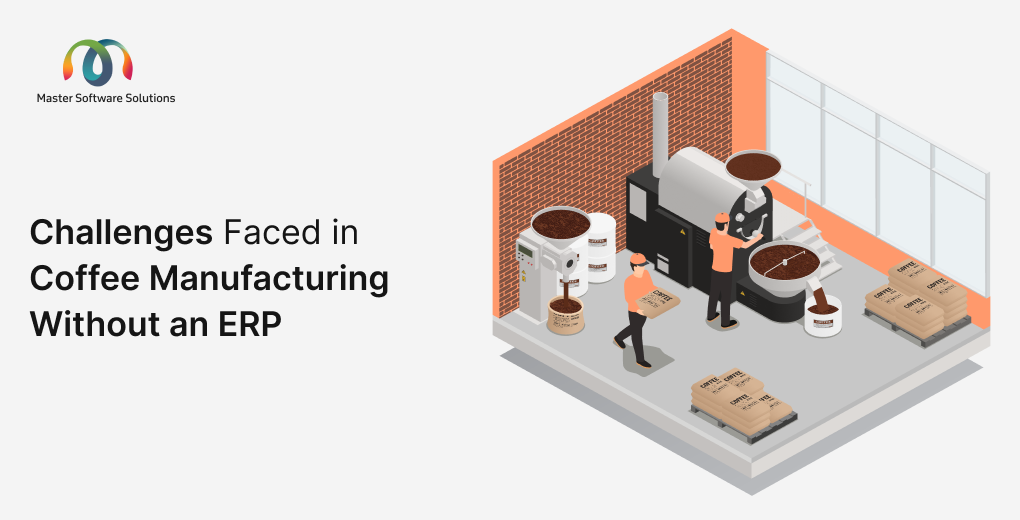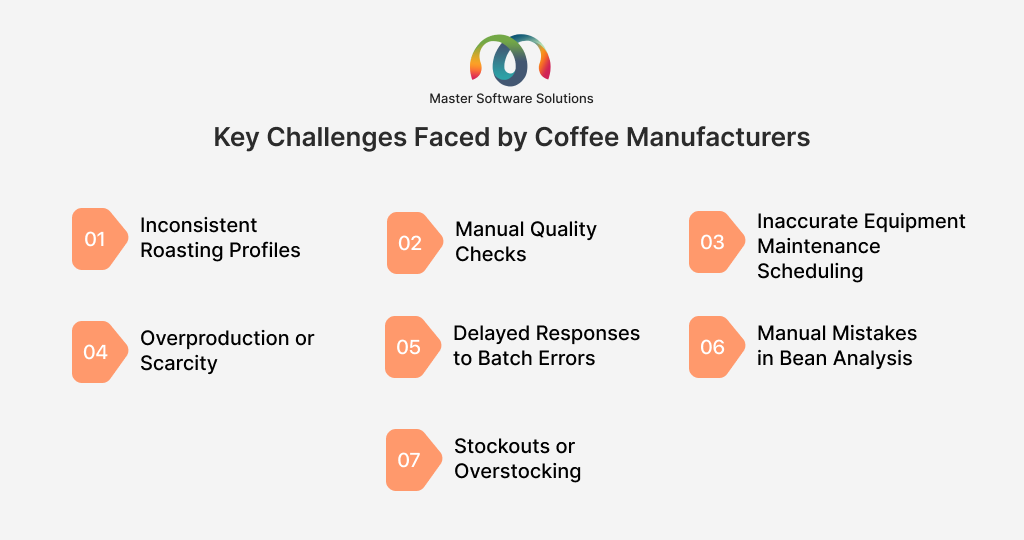Growing consumer demand for quality, sustainability, and innovation is a key driver behind the thriving coffee manufacturing industry. However, behind the aroma of freshly roasted beans lies a complex production process that involves sourcing raw materials, managing inventory, ensuring quality control, and meeting delivery timelines. This is where ERP software for the coffee industry comes in.
Without a centralized system, like an ERP (Enterprise Resource Planning), these operations can quickly become chaotic. Many coffee manufacturers struggle with manual data entry, production delays, supply chain inefficiencies, and a lack of real-time visibility across departments.
This blog explores the challenges faced by coffee manufacturing businesses without an ERP and how these issues can impact efficiency, quality, and profitability.
Key challenges faced by coffee manufacturers
The coffee manufacturing process involves multiple complex steps, from sourcing beans to roasting, packaging, and distribution. However, without a streamlined system in place, manufacturers often face operational inefficiencies that affect quality and productivity. Below are some of the key challenges that coffee manufacturers commonly face:
Inconsistent roasting profiles
Manual production monitoring is prone to human errors in recording critical details, such as roasting times, temperatures, and bean quality. Even the slightest deviations in roasting profiles can alter the flavor, resulting in inconsistent batches that fail to meet customer expectations. Implementing an ERP system can automate the collection and monitoring of real-time production data, ensuring precise control over every roast.
Consistent data tracking not only enhances product quality and customer satisfaction (CSAT) but also helps reduce complaints and product returns. With ERP-driven insights, manufacturers can quickly identify the root cause of production issues, shift from reactive to proactive quality control, and maintain the flavor consistency that strengthens brand trust and loyalty.
Implications of inconsistent roasting profiles
- Variations in flavor and aroma reduce product quality and brand reliability.
- Increased customer complaints and returns impact revenue and reputation.
- Retailers and distributors lose confidence in product consistency.
- Lack of data integration makes it difficult to trace and resolve production issues.
- Missed opportunities for process optimization and predictive maintenance.
- Difficulty in maintaining standardized roast profiles across multiple facilities or shifts.
Manual quality checks
Many businesses still perform quality checks manually through physical inspections, paper-based logs, and human judgment. While this approach may be feasible on a small scale, it becomes inefficient and prone to errors as production grows. Relying on manual checks makes it difficult to maintain consistency across batches, especially when parameters like bean size, moisture level, roast color, and aroma are prone to human interpretation.
Without an ERP system, there is no centralized method for recording, analyzing, or tracking quality data throughout the production process. This lack of automation and data integration increases the risk of overlooking defects, delaying corrective actions, and producing inconsistent results. An ERP-enabled quality management module allows manufacturers to define quality control checkpoints, automate testing workflows, and link results directly to specific batches, ensuring real-time visibility and accountability across the process.
Implications of manual quality checks
- Inconsistent quality standards due to subjective human judgment.
- Delayed issue detection leads to higher waste and rework costs.
- The lack of traceability makes it difficult to identify defective batches or sources of raw material.
- Inefficient documentation results in scattered or lost paper-based records.
- Reduces production speed due to repetitive manual inspections.
- Difficulty in meeting compliance or certification requirements without verifiable digital records.
Inaccurate equipment maintenance scheduling
Coffee manufacturing relies on precise and consistent machinery performance, from roasters and grinders to packaging and sealing equipment. Manual maintenance scheduling is based on estimated timelines or reactive repairs after a breakdown has already occurred. This approach increases the risk of unexpected downtime, inconsistent roasting quality, and production delays.
Without an ERP system, maintenance activities, spare part inventory, and equipment performance data are often managed separately, leading to poor visibility and missed service intervals. An ERP-driven maintenance enables manufacturers to schedule preventive maintenance based on usage hours, sensor data, or production cycles. It automates work orders, sends alerts for upcoming maintenance, and tracks equipment history, all in one place. This ensures machinery runs efficiently, reduces unplanned stoppages, and extends the asset lifespan.
Implications of inaccurate maintenance scheduling
- Unplanned equipment downtime disrupts production schedules and order fulfillment.
- Inconsistent roast quality due to poorly calibrated or malfunctioning machines.
- Higher repair and replacement costs from neglected preventive maintenance.
- Reduced equipment lifespan increases long-term capital expenses.
- Production bottlenecks and delayed deliveries lower customer satisfaction.
- Difficulty in analyzing the root causes of equipment failure due to fragmented maintenance records.
Overproduction or scarcity
Balancing production with actual demand is a constant challenge for coffee manufacturers. Manual production planning is based on inaccurate data, which causes overproduction or scarcity. Overproduction ties up the capital in unsold stock, and scarcity leads to insufficient output that fails to meet customer demand. Both scenarios hurt profitability and customer satisfaction.
Without an ERP system, forecasting depends on guesswork or outdated sales data. This makes it difficult to synchronize production schedules with real-time inventory levels, sales orders, and supply chain activities. An ERP-driven demand planning and inventory management system enables coffee manufacturers to predict demand, adjust production accordingly, and maintain optimal stock levels. With real-time insights, businesses can reduce waste, avoid shortages, and ensure a smooth supply of fresh coffee products.
Implications of overproduction or scarcity
- Overproduction leads to excess inventory, storage costs, and potential product spoilage.
- Scarcity results in missed sales opportunities and damages customer trust.
- Cash flow disruptions are caused by capital locked up in unsold stock or urgent raw material purchases.
- Inefficient resource utilization, with labor and machinery used inconsistently.
- Inaccurate forecasting due to fragmented or outdated data sources.
Delayed responses to batch errors
Even minor errors during roasting, blending, or packaging can compromise an entire batch. Manual monitoring and reporting make it time-consuming to identify these errors. By the time corrective action is taken, the affected batch may have already been processed, packaged, or shipped, resulting in waste and dissatisfied customers.
Without an ERP system, quality data, production logs, and batch records are fragmented across spreadsheets, paper forms, or siloed software, making it difficult to detect issues in real-time. An ERP-enabled production and quality module automatically tracks key parameters, flags deviations instantly, and provides actionable alerts. This ensures that batch errors are detected promptly, corrective measures are applied immediately, and potential losses are minimized.
Implications of delayed responses to batch errors
- Increases waste due to defective or off-spec batches being processed further.
- Higher operational costs from rework, disposal, or emergency corrective actions.
- Customer dissatisfaction occurs if flawed coffee reaches retailers or consumers.
- Damages brand reputation due to inconsistent product quality.
- Reactive quality control instead of proactive prevention.
- Difficulty in root-cause analysis because batch error data is scattered or incomplete.
Manual mistakes in bean analysis
Coffee quality begins with the raw beans, and accurately analyzing them is critical to producing a consistent final product. Manual analysis, such as checking moisture content, bean size, defects, and aroma, relies heavily on human judgment and can be prone to errors. Even small mistakes in assessing bean quality can affect roasting profiles, flavor consistency, and overall product quality.
Without an ERP system, data from green bean inspections is often recorded on paper or separately on spreadsheets, making it difficult to track trends, compare supplier lots, or identify recurring quality issues. An ERP-integrated quality module automates data capture, links bean analysis results to specific suppliers and batches, and provides real-time insights. This minimizes human error, ensures standardized quality assessment, and allows manufacturers to make informed decisions before beans enter production.
Implications of manual mistakes in bean analysis
- Inconsistent roasting outcomes due to incorrect assessment of bean characteristics.
- Higher risk of off-flavor batches, which affects customer satisfaction.
- Difficulty in tracing when sourcing issues or defects arise.
- Increased waste and production costs from rejected batches late in the process.
- Reduced supplier accountability, as quality trends are not properly tracked.
- Inability to implement predictive quality measures without integrated historical data.
Stockouts or overstocking
Maintaining the right inventory balance is critical in coffee manufacturing. Stockouts can stop production and delay order fulfillment when you run out of finished goods, packaging materials, or raw beans. On the other hand, overstocking increases the risk of spoiling, especially for perishable coffee products, forecasts inventory requirements, consumes capital in excess inventory, and increases storage costs.
Without an ERP system, inventory data is often scattered across spreadsheets or manual logs, making it difficult to track real-time stock levels, predict demand, or coordinate with suppliers. An ERP-enabled inventory management module provides real-time visibility into stock levels, automates reorder points, and integrates demand forecasting. This ensures that the manufacturers maintain optimal inventory, reduce waste, avoid production delays, and consistently meet customer orders.
Implications of stockouts or overstocking
- Production delays occur when raw materials are unavailable.
- Lost sales and customer dissatisfaction due to unfulfilled orders.
- Increased storage and holding costs for excess inventory.
- Higher risk of product spoilage for perishable goods like coffee beans.
- Inefficient cash flow management due to capital tied up in unnecessary stock.
- Difficulty in planning production cycles and responding to market demand.
How does Master Software Solutions help your business?
Master Software Solutions is an ERP implementation company that creates unique enterprise-level solutions using ERP platforms such as Microsoft Dynamics Business Central and Odoo. We offer solutions to a wide range of industries, including the coffee industry. If you are a coffee manufacturer, retailer, or distributor looking to implement an ERP solution, contact us.

